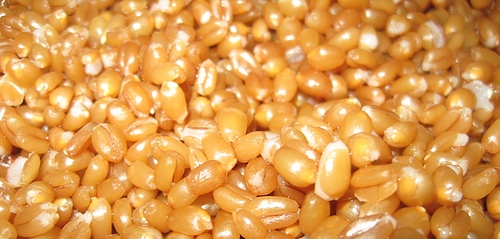Not the most common food, but an interesting and tasty one, I thought I’d look into the health benefits of wheat berries a bit and share them with you, along with the recipe for a good wheat berry dish — which my partner, Marika, just made and I am actually eating as I write this (probably not a good thing to do, health-wise)… But that’s a topic for another day.
So, first of all, what’s good about these little guys?
Health Benefits of Wheat Berries
To start off, I consulted my trusty book, Healing with Whole Foods by Paul Pitchford, one of the best food books in the world in my humble opinion. Wheat berries are the kernel or seed of a wheat plant. As such, they help the kidneys, heart and mind, according to Chinese medicine. They are good for growth, weight gain, and fat formation — something obese or overweight people may wish to avoid, but others (like myself) may need.
“Wheat absorbs a wider range of minerals from rich soil than other grains,” Pitchford writes. “In addition, its nutrient profile — the comparison of its nutrients with one another — is similar to that of the human body.”
Of course, wheat often gets a bit of a bad rap in the U.S. This is, no doubt, partly due to the fact that Americans need to lose weight more than they need to gain weight. But there are other factors at play as well. “The fact that people have greatly overeaten refined and rancid wheat products that have been genetically altered for smut resistance continuously since 1926, partly explains the many common allergies to this vital food.”
Whole wheat berries skip some of the problems of such wheat, however, and some people who are allergic to “wheat” are fine eating wheat berries.
Here’s more on the health benefits of wheat berries from LovetoKnow:
The health benefits of wheat berries are numerous. They contain protein, lots of fiber, and many essential vitamins and nutrients such as:
- Iron
- Calcium
- B vitamins
- Vitamin E
- Folate
- Potassium
They are also low in fat. Wheat berries are very high in gluten, however, making them unsuitable for gluten-reduced or gluten-free diets.
One of the most appealing aspects of wheat berries is their shelf life. These kernels can be stored, in a cool dry place inside an airtight container for up to ten years.

There are other healthy food resources like soya and berries that are not so known. I like articles giving out tips on which food are nutritious and therefore healthy for the body.